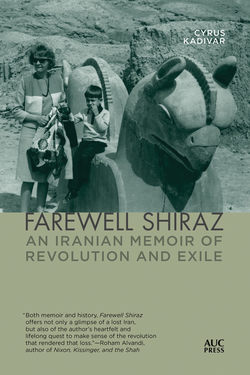Читать книгу Farewell Shiraz - Cyrus Kadivar - Страница 8
На сайте Литреса книга снята с продажи.
ОглавлениеACKNOWLEDGMENTS
Writing this book has been one of the most challenging and rewarding experiences of my life. However, seeing it published leaves me indebted to so many people who made it possible. I am eternally thankful to Nadia Naqib, my editor at the American University in Cairo (AUC) Press. Her sharp eye, patience and sensitivity, loving support, and disciplined approach played a vital part in transforming my manuscript into the final version of this book, putting my story out into the world. My great thanks are also extended to Neil Hewison, Tarek El-Elaimy, Katie Holland, and Ingrid Wassmann at the AUC Press and to Ælfwine Mischler. It was a joy to work with them during the process of editing, proofreading, indexing, designing, publishing, and marketing Farewell Shiraz.
Although my book draws heavily on my family history and recollections of my childhood and adolescent years during pre-1979 Iran, it is also part of a much larger, epoch-changing story—of a lost world, of nation building and rebellion, and of my quest from the vantage point of exile to comprehend and make sense of the events that led to the end of twenty-five centuries of monarchy in Iran and the founding of an Islamic republic. Not everybody will agree with my interpretation of the past, but I do believe that each generation has a responsibility to the following one: to pass on an authentic account of what they witnessed, experienced, and felt, particularly during times of great national upheaval. In my search for answers I was ultimately drawn into another realm; that of many witnesses and survivors among the émigrés within the Persian diaspora who, like me, left Iran in the wake of the popular revolution that overthrew the last shah of Iran in 1979.
Thus, I owe a special debt of gratitude to all those who generously agreed to share their, sometimes painful, memories of their lives and experiences during the Pahlavi era, the final years of the shah’s rule, and the convulsion that violently transformed their country politically, economically, socially, and culturally. They not only offered me their hospitality but tirelessly answered my many questions, provided me with useful introductions, and shared poignant photographs from treasured family albums. They became my personal eyewitnesses to pivotal moments, and their expertise, reminiscences, and frank insights were invaluable in enabling me to expand my own understanding of a colossal tragedy.
Many of their names appear throughout the text and are listed at the end of the book as primary and informed sources. No matter how great or small their contribution, they all helped me to shape my narrative. I have a profound appreciation for the published accounts and impressions of travelers, archaeologists, historians, scholars, journalists, and writers, and Iranian sources I often consulted to fill the gaps in my knowledge and to gather inspiration. Thanks are also due to the wonderful people I met in Egypt: friendly hotel managers, taxi drivers, tourist guides, and ordinary folk, and, especially, the old and young attendants at the Grand Rifa‘i Mosque in Cairo.
Around the globe, a network of friends read and re-read my initial drafts, and provided much-welcomed critiques and constructive feedback. Because of the delicate political situation in Iran they have preferred to remain anonymous and I have respected that wish. They all know who they are and have my love and heartfelt thanks. One person I will name is my lifelong friend Karim. He played a major role in reminding me to view the past as objectively as possible. Over many hours and cups of coffee together we relived the good old days of our youth in Iran, indulging in memorable anecdotes as well as engaging in more serious discussions about what happened to our country and missing the lives we left behind. He and others know how much this book means to our generation.
Non-Iranian friends, neighbors, and colleagues who have heard me talk about Iran and my past for as long as they have known me will perhaps understand my reasons for wanting to publish this book. They will, I hope, enjoy reading it.
Prior to submission, editor and writer Karl French helped me tidy up my grammar and turned an often unwieldy manuscript into a readable piece of work. He has my thankful respect and undying friendship.
I cannot thank enough my wife and soulmate, Shuhub, for putting up with my long absences, particularly when I had to travel for my research or locked myself away in my study to type or use the telephone. To her credit she never stopped believing in this book. Her sound advice, humor, and unwavering support and encouragement made it possible for me to persevere. I love her even more for seeing my dream become reality.
Finally, I would like to express my everlasting love to my paternal and maternal grandparents, my mother, Jeanne, and my late father, Dr. Kayomars R. Kadivar, my brother Darius and sister Sylvie, my cousin Sabina for rescuing my precious diaries, Mitra for introducing me to Hafez, the great Persian poet for all times, and other relatives scattered across the world, teachers, and former classmates at the Shiraz International Community School (SICS), and my beloved hometown of Shiraz, without which this story would not have come to life. My sincere hope is that whoever reads this book will come away with a better understanding of, and appreciation for Iran, its recent history, its rich heritage, and above all, its people.
